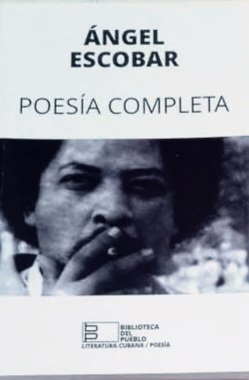¿UN ÁNGEL DE ALAS DEFECTUOSAS?/AN ANGEL WITH BROKEN WINGS? (ESP-ENG)

Cuando me enteré que en la Feria del Libro de la Habana de este año iba a estar disponible la obra completa de Ángel Escobar en dos partes, salí a buscarlo, lo perseguí como quien busca un tesoro y solo alcancé el Primer tomo, entristecida me fui a casa porque a pesar de tener su obra completa en formato digital quería manosear sus poemas en físico.
When I found out that Ángel Escobar’s complete works would be available in two volumes at this year’s Havana Book Fair, I rushed to find them. I chased after them like someone hunting for treasure, but I only managed to get the first volume. Heartbroken, I went home—even though I already had his complete works in digital format, I wanted to hold his poems in my hands, to feel their physical weight.
Desde que tuve mi primer encuentro con la poesía de este autor quedé totalmente enamorada de cada uno de sus poemas, quizás por su voz poética singular, por su manera de comunicar tan genuinamente, por su naturalidad, yo creo de cierto modo que fue por su dramaturgia.
From the moment I first encountered Ángel Escobar’s poetry, I fell completely in love with every one of his poems. Maybe it was his singular poetic voice, his raw and genuine way of communicating, his naturalness. Or perhaps, in some way, it was his theatricality.
Ángel Escobar Varela fue un escritor guantanamero que desde muy joven fue despuntando en la literatura cubana, graduado de Artes Dramáticas en la Escuela Nacional de Arte (ENA) en 1977 y en 1984 en Artes Escénicas por el Instituto Superior de Arte (ISA). Obtuvo disímiles lauros de gran relevancia como los Premios David y Roberto Branly de la UNEAC en 1978 y 1985, respectivamente.
Ángel Escobar Varela was a writer from Guantánamo who stood out in Cuban literature from a very young age. He graduated in Dramatic Arts from the National School of Arts (ENA) in 1977 and in Performing Arts from the Higher Institute of Art (ISA) in 1984. He earned numerous prestigious awards, including the UNEAC’s David Prize (1978) and Roberto Branly Prize (1985).
¿Por qué te gusta Ángel Escobar ?-me pregunta un amigo, si llevaba a todas partes un olor a muerte que aterraba.
Why do you like Ángel Escobar? a friend once asked me, if he carried the stench of death everywhere, a stench that terrified?
Este poeta se entregó más allá del cuerpo, intentó matar su sombra, los fantasmas, los delirios, las quejas, todo a través de un filo poético que quizás utilizó como arma más certera. Un hombre que utilizaba la soledad como sitio aislante para ir y venir cuantas veces deseara, como un lugar reservado donde podía escapar con una mochila llena de reflexiones, de dudas, de señalamientos de su propia existencia.
This poet gave himself over—beyond the body. He tried to kill his shadow, his ghosts, his delusions, his laments—all through a poetic blade he wielded like his sharpest weapon. A man who used solitude as an isolating space to come and go as he pleased, a reserved place where he could escape with a backpack full of reflections, doubts, and indictments of his own existence.
PALILLO
UN desterrado busca algo que lo aterre -
o al menos alguien que lo entierre,
algo terrible, y alguien de la tierra
de la que fue desterrado: porque no tiene nada -
ni siquiera el recuerdo de la nada -
ni la promesa de la nada que fue, y es,
en otras tierras: como no en la suya y en la Tierra
no haya nada, queda fuera de sí,
y ya está en otra, salta -
y ve que eso tampoco justifica nada;
y es la nadería, el absurdo: rostro
sin vergüenza y sin nada, vacío, ruinas -
avecindamiento pendenciero, orgullo, amor
gastado por el uso y el abuso - ; hay besos
que lo pudren cuando estaba ya podrido -
hay dones que lo rompen cuando estaba
ya roto; y aterido, menor y desterrado
¿queda?
MATCHSTICK
An exile searches for something to terrify him—
or at least someone to bury him,
something terrible, and someone from the land
from which he was exiled: because he has nothing—
not even the memory of nothingness—
nor the promise of the nothingness that was, and is,
in other lands: since in his own and on Earth
there is nothing, he steps outside himself,
and is already elsewhere, he leaps—
and sees that this, too, justifies nothing;
and it’s nothingness, the absurd: a face
without shame and without anything, empty, ruins—
a quarrelsome neighborhood, pride, love
worn down by use and abuse—; there are kisses
that rot him when he was already rotten—
there are gifts that break him when he was
already broken; and frozen, lesser, exiled,
what remains?
De esos estados de autoreflexión han surgido diversos cuestionamientos y teorías, algunos afirmaban que este autor se regodeaba con la muerte y sobrevivía, a su vez, satisfecho de su búsqueda, de una forma cíclica. Coincido con los que plantean que el centro de la poesía de Escobar, era su propio cuerpo que se postraba ante la muerte como si desease un fin para salvarse.
From these states of self-reflection, many questions and theories have emerged. Some claimed this author reveled in death, surviving—yet satisfied—in his cyclical search. I agree with those who argue that the core of Escobar’s poetry was his own body, prostrating itself before death as if longing for an end to find salvation.
Algunos referían que su obra era tan compleja como el propio autor. Influenciado por una agonía existencial de autores como Artaud, Pavesse, Modigliani. Me gusta pensar que Escobar ensayaba su muerte con recurrencia, en su poesía se puede encontrar ese salto con sorpresa o ironía.
Some said his work was as complex as the man himself. Influenced by the existential agony of writers like Artaud, Pavese, and Modigliani, I like to think Escobar rehearsed his death repeatedly—his poetry reveals that leap, sometimes with surprise, sometimes with irony.
El agregado cultural me miró como se mira a un muerto.
Yo me morí, el 20 de marzo de 1987, es decir, tres años después de esa mirada, que me mortificó igual que un permiso de salida
The cultural attaché looked at me as one looks at a dead man.
I died on March 20, 1987—that is, three years after that gaze, which tormented me like an exit permit.
Antes de cumplir sus 40 años, este poeta se suicida un 14 de febrero de 1997, saltando de su apartamento en el Vedado, Habana, dejando una huella imborrable en el pavimento y en los poetas de su generación, además, en todos aquellos amigos que lo conocieron, y en los que aún, lo siguen descubriendo.
Before turning 40, this poet took his own life on February 14, 1997, jumping from his apartment in Vedado, Havana. He left an indelible mark on the pavement—and on the poets of his generation, on all who knew him, and on those who are still discovering him today.

Esta imagen fue creada con Canva/ This image was created with Canva
This was a really nice post! I didn’t know about Ángel Escobar before, but your words helped me understand how powerful his poetry was. The way you talked about his struggles and deep emotions makes me want to read his work. Thank you for sharing this!
Excelente post @lacaracola
Congratulations @lacaracola! You have completed the following achievement on the Hive blockchain And have been rewarded with New badge(s)
Your next target is to reach 600 upvotes.
You can view your badges on your board and compare yourself to others in the Ranking
If you no longer want to receive notifications, reply to this comment with the word
STOPCheck out our last posts:
La conexión que has logrado con este autor es fascinate. La voz lírica te cautivó, eres capaz de sentir cada una de sus manifestaciones y recrearlas en la piel.